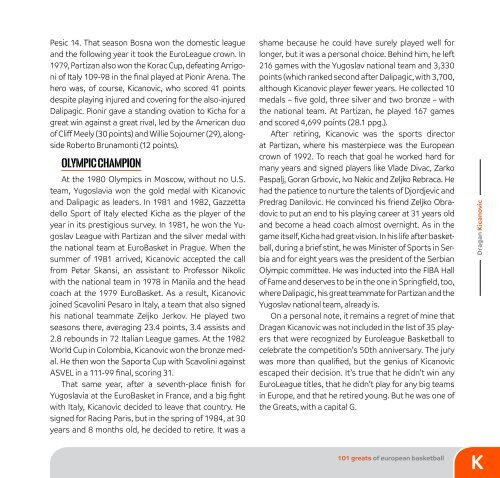101 Greats of European Basketball
Create successful ePaper yourself
Turn your PDF publications into a flip-book with our unique Google optimized e-Paper software.
Pesic 14. That season Bosna won the domestic league<br />
and the following year it took the EuroLeague crown. In<br />
1979, Partizan also won the Korac Cup, defeating Arrigoni<br />
<strong>of</strong> Italy 109-98 in the final played at Pionir Arena. The<br />
hero was, <strong>of</strong> course, Kicanovic, who scored 41 points<br />
despite playing injured and covering for the also-injured<br />
Dalipagic. Pionir gave a standing ovation to Kicha for a<br />
great win against a great rival, led by the American duo<br />
<strong>of</strong> Cliff Meely (30 points) and Willie Sojourner (29), alongside<br />
Roberto Brunamonti (12 points).<br />
Olympic champion<br />
At the 1980 Olympics in Moscow, without no U.S.<br />
team, Yugoslavia won the gold medal with Kicanovic<br />
and Dalipagic as leaders. In 1981 and 1982, Gazzetta<br />
dello Sport <strong>of</strong> Italy elected Kicha as the player <strong>of</strong> the<br />
year in its prestigious survey. In 1981, he won the Yugoslav<br />
League with Partizan and the silver medal with<br />
the national team at EuroBasket in Prague. When the<br />
summer <strong>of</strong> 1981 arrived, Kicanovic accepted the call<br />
from Petar Skansi, an assistant to Pr<strong>of</strong>essor Nikolic<br />
with the national team in 1978 in Manila and the head<br />
coach at the 1979 EuroBasket. As a result, Kicanovic<br />
joined Scavolini Pesaro in Italy, a team that also signed<br />
his national teammate Zeljko Jerkov. He played two<br />
seasons there, averaging 23.4 points, 3.4 assists and<br />
2.8 rebounds in 72 Italian League games. At the 1982<br />
World Cup in Colombia, Kicanovic won the bronze medal.<br />
He then won the Saporta Cup with Scavolini against<br />
ASVEL in a 111-99 final, scoring 31.<br />
That same year, after a seventh-place finish for<br />
Yugoslavia at the EuroBasket in France, and a big fight<br />
with Italy, Kicanovic decided to leave that country. He<br />
signed for Racing Paris, but in the spring <strong>of</strong> 1984, at 30<br />
years and 8 months old, he decided to retire. It was a<br />
shame because he could have surely played well for<br />
longer, but it was a personal choice. Behind him, he left<br />
216 games with the Yugoslav national team and 3,330<br />
points (which ranked second after Dalipagic, with 3,700,<br />
although Kicanovic player fewer years. He collected 10<br />
medals – five gold, three silver and two bronze – with<br />
the national team. At Partizan, he played 167 games<br />
and scored 4,699 points (28.1 ppg.).<br />
After retiring, Kicanovic was the sports director<br />
at Partizan, where his masterpiece was the <strong>European</strong><br />
crown <strong>of</strong> 1992. To reach that goal he worked hard for<br />
many years and signed players like Vlade Divac, Zarko<br />
Paspalj, Goran Grbovic, Ivo Nakic and Zeljko Rebraca. He<br />
had the patience to nurture the talents <strong>of</strong> Djordjevic and<br />
Predrag Danilovic. He convinced his friend Zeljko Obradovic<br />
to put an end to his playing career at 31 years old<br />
and become a head coach almost overnight. As in the<br />
game itself, Kicha had great vision. In his life after basketball,<br />
during a brief stint, he was Minister <strong>of</strong> Sports in Serbia<br />
and for eight years was the president <strong>of</strong> the Serbian<br />
Olympic committee. He was inducted into the FIBA Hall<br />
<strong>of</strong> Fame and deserves to be in the one in Springfield, too,<br />
where Dalipagic, his great teammate for Partizan and the<br />
Yugoslav national team, already is.<br />
On a personal note, it remains a regret <strong>of</strong> mine that<br />
Dragan Kicanovic was not included in the list <strong>of</strong> 35 players<br />
that were recognized by Euroleague <strong>Basketball</strong> to<br />
celebrate the competition’s 50th anniversary. The jury<br />
was more than qualified, but the genius <strong>of</strong> Kicanovic<br />
escaped their decision. It’s true that he didn’t win any<br />
EuroLeague titles, that he didn’t play for any big teams<br />
in Europe, and that he retired young. But he was one <strong>of</strong><br />
the <strong>Greats</strong>, with a capital G.<br />
<strong>101</strong> greats <strong>of</strong> european basketball<br />
Dragan Kicanovic<br />
K
















